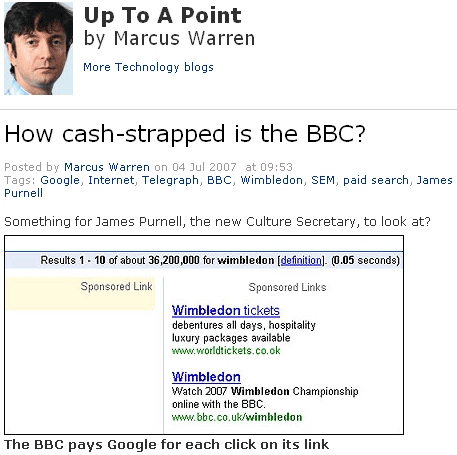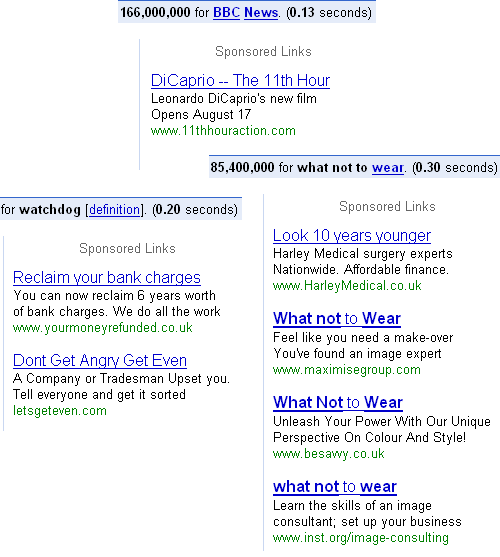A level playing field for the BBC on Google AdWords?
Marcus Warren wrote a piece in his Telegraph blog this week asking if the BBC can really be that cash-strapped if they can afford to place text adverts on Google for their online coverage of Wimbledon.

Personally, I've never been particularly in favour of the BBC spending money on search engine marketing.
My first job at the BBC was to promote BBC URLs to external search providers, and I remember strongly resisting overtures from both Yahoo! and LookSmart about paying for directory entries. My reasoning at the time being that their directories would suffer more from the credibility gap of not having BBC content comprehensively included, than the BBC would suffer from a drop in traffic if it didn't pay for inclusion.
However, whilst Marcus Warren makes an interesting point in the Telegraph about the BBC's SEM, in a sense whether the money is spent on Google or not is a diversion from the main issue.
Warren is actually asking the bigger questioning - should the BBC do marketing?
Whilst I was at the BBC the general feeling coming out of the marketing department was that promoting services and programmes meant more people knew about them, so more people accessed them, and so the key metric of cost per reach would be improved.
(Let's just leave aside for a moment the point that if, as in this instance, you are advertising a bandwidth hungry online streaming service, it actually becomes incrementally more expensive with each user)
If you accept that the BBC ought to advertise services to Licence Fee payers so that they know what they are getting in return for their telly tax - and I fully accept that some people don't - then there is no real reason why the BBC shouldn't be using Google AdWords as an advertising channel.
After all, Google hoovered up a massive chunk of advertising spend in the UK in the last year - and the BBC can't even get access to advertise on a sizeable chunk of that market, in the shape of TV spots on ITV, Channel 4, Five, Sky et al.
In fact, I'd argue that all of that advertising spend leaking out of the British economy into the pockets of the U.S. owned internet giant is a much more serious issue for the media industry on the whole than whether the BBC splashes a bit of cash on AdWords.
When people talk about the commercial impact of the BBC on the media market, they often worry about whether the corporation has left a level playing field. I wonder whether the playing field in the search results arena is level if, as Marcus Warren implies, the BBC shouldn't be allowed to advertise on Google, whilst non-BBC affiliated commercial operations are happily able to hijack the keywords associated with BBC programme brands...

...and when even parts of the British press, so vigilant at keeping a check on the BBC's ambitions, are happy to do it too when it suits.

In my current, unemployed, state, I see no reason why the BBC should not market its brands, programmes and services to licence-fee payers. We, the licence-fee payer, insist that the BBC gives us great value for money; it will not do that if it keeps its products secret from us!
You say...
In fact, commercial television and radio companies cannot turn advertising down for competitive reasons: Sky advertises regularly on ITV and Channel 4, for example. I -think- that Sky took ITV to court to be able to achieve this. So, there's no reason why the BBC couldn't advertise on these channels (nor the fine, fine commercial radio stations). I doubt the BBC would get the best price, mind.
It should be mentioned that it, of course, doesn't happen the other way around. Commercial broadcasters cannot advertise on the BBC. As a former employee of a commercial radio station, it's highly galling to watch a prolonged on-screen promotion for BBC London 94.9 during every local news break on BBC1, for example, while knowing that commercial radio has no opportunity to get into that space; and that equivalent promotion within London Tonight would be illegal, falling foul of product placement rules. Having said that, it's not really as if BBC London 94.9 has really set the London radio market alight, so perhaps it doesn't matter much after all.
You see - get yourself a blog and it helps you learn something new every day. I just assumed that TV channels didn't sell advertising to each other ever. It just wouldn't make sense would it, like adverts for the Express appearing in the Mail.
Perhaps after the big plug for Radio LDN in the middle of the news they could get the presenter to say "Other local radio stations are also available"?